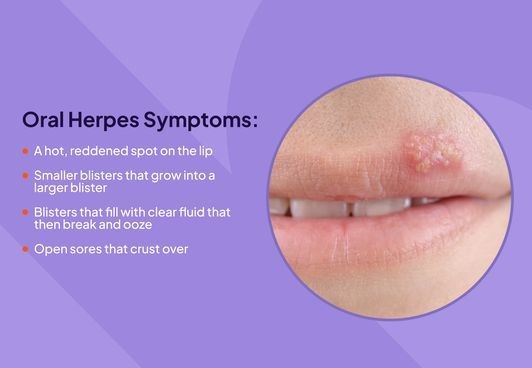A nurse is contributing to the plan of care for a client who is experiencing a herpes simplex outbreak. Which of the following interventions should the nurse recommend?
Avoid over-the-counter topical ointments
Cleanse skin eruptions with povidone-iodine
Administer an antibiotic medication
Place disposable thermometers in the client's room
The Correct Answer is B
B. Herpes simplex is a viral infection that causes skin eruptions or lesions. To promote healing and prevent secondary infections, it is important to keep the affected area clean. Cleansing the skin eruptions with povidone-iodine, an antiseptic solution, can help reduce the risk of infection and promote healing.

The other options are incorrect:
A. Over-the-counter topical ointments are generally not recommended for the treatment of herpes simplex outbreaks. It is best to consult with a healthcare provider for appropriate medication and treatment options.
C.Herpes simplex is a viral infection, and antibiotics are used to treat bacterial infections. Antibiotics are not effective against viral infections like herpes simplex.
D. Placing disposable thermometers in the client's room is not directly related to the management of a herpes simplex outbreak. It is important to focus on interventions specific to the client's condition.
Nursing Test Bank
Naxlex Comprehensive Predictor Exams
Related Questions
Correct Answer is C
Explanation
Elevating the head of the bed while sleeping is a recommended strategy for managing GERD (gastroesophageal reflux disease). By raising the head of the bed, gravity helps to prevent stomach acid from flowing back into the esophagus, reducing the likelihood of acid reflux and associated symptoms.
"You should eat three large meals and two snacks per day" is not recommended for GERD management. Instead, it is advised to have smaller, more frequent meals throughout the day to reduce the pressure on the stomach and minimize the likelihood of acid reflux.
"You should lay down for 1 hour following a meal" is not recommended for GERD management. It is advised to avoid lying down immediately after meals, as this can increase the risk of acid reflux. It is generally recommended to wait at least 2 to 3 hours before lying down.
"You should only drink 2 cups of coffee per day" is a specific recommendation related to caffeine intake, which can potentially trigger or worsen GERD symptoms in some individuals. However, this statement alone does not encompass the comprehensive dietary recommendations for managing GERD.
Correct Answer is C
Explanation
Helping the client develop positive self-talk and challenging negative thoughts can be beneficial in managing depressive symptoms. Assisting the client in recognizing negative self-perceptions and replacing them with more positive and realistic thoughts can help improve mood and self-esteem.
Exercise has been shown to have mood-enhancing effects and can help alleviate symptoms of depression. However, exercise should be done earlier in the day rather than right before bedtime, as it can have stimulating effects that may interfere with sleep.
It is important to encourage the client to engage in activities and spend time with others. Isolation and spending excessive time alone can exacerbate depressive symptoms. However, it is also important to respect the client's need for privacy and personal space.
While diet does play a role in overall well-being, there is no specific evidence to support the use of low-protein snacks for the treatment of major depressive disorder. It is important to provide the client with a well-balanced diet that includes a variety of nutrients to support overall health.
Whether you are a student looking to ace your exams or a practicing nurse seeking to enhance your expertise , our nursing education contents will empower you with the confidence and competence to make a difference in the lives of patients and become a respected leader in the healthcare field.
Visit Naxlex, invest in your future and unlock endless possibilities with our unparalleled nursing education contents today
Report Wrong Answer on the Current Question
Do you disagree with the answer? If yes, what is your expected answer? Explain.
Kindly be descriptive with the issue you are facing.
